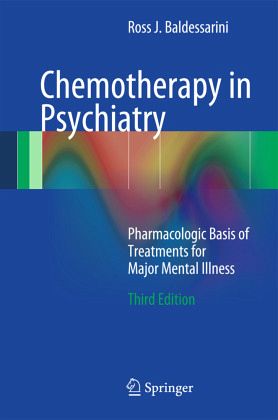
Chemotherapy in Psychiatry
Pharmacologic Basis of Treatments for Major Mental Illness
Versandkostenfrei!
Versandfertig in 6-10 Tagen
113,99 €
inkl. MwSt.
Weitere Ausgaben:

PAYBACK Punkte
57 °P sammeln!
Use of psychotropic drugs has come to dominate clinical practice in psychiatry worldwide-perhaps owing largely to perceived simplicity, ease of use, and apparent efficiency, as well as apparent cost-effectiveness of such treatments. Nevertheless, medicinal treatments for patients with psychiatric disorders are but one component of comprehensive clinical care of complex human problems. Extensively updated since its second edition in 1985, Chemotherapy in Psychiatry, Third Edition, again addresses basic aspects of modern psychopharmacology and clinical applications of drugs used in the treatment...
Use of psychotropic drugs has come to dominate clinical practice in psychiatry worldwide-perhaps owing largely to perceived simplicity, ease of use, and apparent efficiency, as well as apparent cost-effectiveness of such treatments. Nevertheless, medicinal treatments for patients with psychiatric disorders are but one component of comprehensive clinical care of complex human problems. Extensively updated since its second edition in 1985, Chemotherapy in Psychiatry, Third Edition, again addresses basic aspects of modern psychopharmacology and clinical applications of drugs used in the treatment of major psychiatric disorders, with major emphasis on psychotic, bipolar, and depressive disorders. The presentation covers descriptions of the main classes of psychotropic drugs, selected information concerning their known action mechanisms and metabolic disposition, and their clinical applications for acute illnesses and to prevent recurrences and long-term morbidity. Also covered are limitations and adverse effects of each type of agent, with emphasis on the fact that all psychotropic medicines have adverse effects that range from annoying to potentially lethal. Chemotherapy in Psychiatry, Third Edition, outlines the need to balance benefits and risks at the level of individual persons. Authoritative, and an important contribution to the literature, Chemotherapy in Psychiatry, Third Edition is an invaluable resource for physicians, scientists, trainees, and policymakers.














